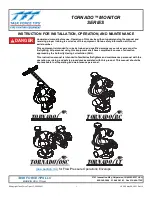
6
resettable overdischarge protection may be delivered in 'sleep mode' i.e. power to the positive terminal has
been internally disconnected i.e. no voltage will be measured at the battery terminals/posts. During storage the
battery may have lost further charge.
VERY FLAT NEGLECTED BATTERIES:
A LiFePO
4
battery left deep-discharged for an extended period may
develop permanent damage in one or more cells that may heat up excessively during charging. The OptiMate
PRO DUO limits charge current if the voltage is below nominal (12V / 12.8V) and the program should detect
obvious cell damage and will automatically suspend charging, but it still remains essential to monitor the battery
temperature during the first hour, then hourly there-after. If at any time the battery is uncomfortably hot to touch
or you notice any unusual signs, DISCONNECT THE CHARGER IMMEDIATELY.
B. CONNECTING TO THE BATTERY
1. Before connecting the charger to the battery always physically inspect the battery, even if new.
WARNING - A damaged battery can overheat and emit explosive gases and a LFP/LiFePO
4
may even
self-combust during charging.
DO NOT CHARGE THE BATTERY if you observe any of the following:
case
deformation such as bulging, cracks or stress fractures, loose battery terminals/posts, or leaking of any kind.
Leaking confirms there is a fatally damaged cell that has burst. The liquid electrolyte is highly flammable and
corrosive and a known carcinogen.
Make sure the positive and negative terminals do not come into contact with each other. Shorting the positive
and negative terminals may cause the battery to vent gas at a very high temperature (known as thermal
runaway). Venting high temperature gas will cause irreparable damage to the motorcycle and / or serious
personal injury or death.
If the battery is in use or being recharged and it gives off an odour, generates heat, becomes deformed,
discoloured or appears abnormal in any way, immediately discontinue use or disconnect it from the charger.
2.
Before making or breaking DC/battery connections, turn off the AC supply using the ON/OFF rocker switch
(SW1) located on the side of the case. (See illustration 1 on page 2).
3.
When preparing a new battery prior to installation, or recharging a used battery in the designated battery
preparation area, always use the fused battery clip set. First connect the red (POS / +) battery clip to the positive
(POS / +) battery terminal, then connect the black (NEG / - ) battery clip to the negative (NEG / - ) battery terminal.
4.
If connecting to a battery installed in a motorcycle,
a) with the provided O-14 fused battery clips: before making connections, first check that the battery clips can
be safely and securely positioned clear from surrounding wiring, metal tubing or the chassis. Make
connections in the following order: First connect the red (POS / +) battery clip to the positive (POS / +)
battery terminal (normally not connected to the chassis), then connect the black (NEG / - ) battery clip to
the negative (NEG / - ) battery terminal or to the chassis well away from the battery and fuel line. Always
disconnect in reverse sequence.
b) through a pre-installed O-01 battery fused lead or other suitable power connector: before connection
inspect the connector, cables to the battery and connection at the battery.
C. PROCEEDING TO CHARGE
13V
12V
min.
11V
Pb
Supply
Pb
LFP
LFP : LiFePO
4
/ LiFe
12.8V 13.2V
Pb : Lead-acid
12V
5
4
3
1a 1b
2
8
6
7
optimate1.com/tm650
LFP
Su
1
2
Su
Supply
11V







































